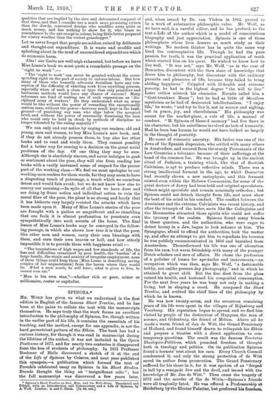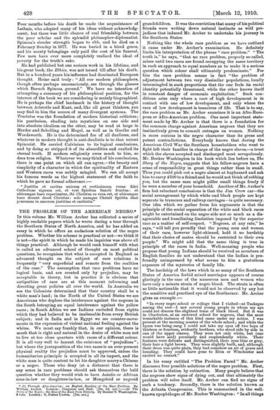SPINOZA.*
ME. WOLF has given us what we understand is the first edition in English of the famous Short Treatise, and he has been at the pains to collate the text with the manuscripts themselves. He says truly that the work forms an excellent introduction to the philosophy of Spinoza, for, though written in the earlier part of his life, it contains the essentials of his teaching, and the method, except for one appendix, is not the bard geometrical pattern of the Ethics. The book has bad a curious history, for though it was read in manuscript during the lifetime of the author, it was not included in the Opera Posthuraa of 1677, and for nearly two centuries it disappeared from the ken of students of philosophy. In 1851 Professor Boehmer of Halle discovered a sketch of it at the end of the Life of Spinoza by Colerus, and next year published this synopsis,—a publication which formed the text of Froude's celebrated essay on Spinoza in his Short Studies. Fronde thought the thing an " insignificant relic " ; but the full manuscript was discovered a few years later, SOinoza's Short Treatise on God, Man, and his Well-Being. Translated and Edited, with an Introduction and Commentary and a Life of Spinoza, by A. Wolf. London : A. and C. Black. ga dd. net.]
and, when issued by Dr. van Vloken in 1862, proved to be a work of substantive philosophic value. Mr. Wolf, as we have said, is a careful editor, and he has prefixed to the text a Life of the author which is a model of conscientious biography and just appreciation. Spinoza is one of those philosophers whose lives deserve as much study as their writings. No modern thinker has in quite the same way lived the contemplative life. Though he had the pure passion for truth, it was the practical application of truth which started him on his quest. He wished to know how to live well. " It was not," says Mr. Wolf, " as in the case of Descartes, discontent with the then state of knowledge that drove him to philosophy, but discontent with the ordinary pursuits and pleasures of life, because they failed to bring abiding happiness." Crippled with ill-health and extreme poverty, he had in the highest degree "the will to live." Later critics mistook his character. Novalis called him a " Gott-trunkner Mann "; but he had as little of bloodless mysticism as he bad of desiccated intellectualism. " I enjoy life," he wrote, " and try to live it, not in sorrow and sighing, but in peace, joy, and cheerfulness." His philosophy was meant for the market-place, a rule of life, a manual of conduct. "M. Spinoza of blessed memory" had few flaws in his character, but his saintliness involved no lack of humanity. Had he been less human he would not have bulked so largely in the thought of posterity.
He came of romantic ancestry. His father was one of the Jews of the Spanish dispersion, who settled with many others in Amsterdam, and secured from the sturdy Protestants of the Low Countries a tolerance because of their sufferings at the hand of the common foe. He was brought up in the ancient ritual of Judaism, a training which, like that of Scottish Calvinism, is apt to produce reflective minds. There was a strong intellectual ferment in the age, to which Descartes had recently shown a new metaphysic, and this ferment existed even within the Hebrew Communion, for some of the great doctors of Jewry had been bold and original speculators. Others might speculate and remain nominally orthodox ; but Spinoza could not detach thought from life, and must show the bent of his mind in his conduct. The conflict between the Arminians and the extreme Calvinists was recent history, and after the triumph of the latter, sects like the Collegiates and the Mennonites attracted those spirits who could not suffer the tyranny of the zealots. Spinoza found many friends in these quarters, and the authorities, who were eager to detect heresy in a Jew, began to look askance at him. The Synagogue, afraid to offend the authorities, took the matter up, and after an attempt to get him to repudiate his heresies he was publicly excommunicated in 1656 and banished from Amsterdam. Thenceforward his life was one of alienation from his race, but warm friendship with many of the younger Dutch scholars and men of affairs. He chose the profession of a polisher of lenses for spectacles and instruments,—an occupation which was then, says Mr. Wolf, "a fashionable hobby, not unlike present-day photography," and in which he attained to great skill. But the fine dust from the glass ruined his health, and hastened his congenital consumption. For the next four years he was busy not only in making a living, but in shaping a creed. He composed the Short Treatise, and evolved the chief lines of the philosophy by which he is known.
He was now twenty-seven, and the seventeen remaining years of his life were spent in the villages of Rijnsburg and Voorburg. His reputation began to spread, and we find him visited by people of the distinction of Huygens, the man of science, and Oldenburg, the friend of Milton. Above all he made a warm friend of Jan de Witt, the Grand Pensionary of Holland, and found himself drawn to relinquish his Ethics and prepare a treatise with a direct application to con- temporary questions. The result was the famous Tractatus Theologico-Politicus, which preached freedom of thought both in theology and politics. On its publication Spinoza found a hornets' neat about his ears. Every Church Council condemned it, and only the strong protection of de Witt saved its author from prosecution. The Grand Pensionary suffered for his share in it, for it was spoken of as "forged in hell by a renegade Jew and the devil, and issued with the knowledge of Mr. Jan de Witt." Then came the tragedy of 1672 and the murder of the de Witts,—Spinoza's friends were all tragically fated. He was offered a Professorship at Heidelberg by the Elector Palatine, but preferred his freedeek,
Four months before his death he made the acquaintance of Leibniz, who adopted many of his ideas without acknowledg- ment; but there was little chance of real friendship between the poor scholar and the splendid philosopher-diplomatist. Spinoza's slender strength began to ebb, and he died on a February Sunday in 1677. He was buried in a hired grave, and his scanty belongings only paid the cost of his funeral.
Few men have ever more completely realised the ideal of poverty for the truth's sake.
He had published but one serious work in his lifetime, and his great book, the Ethics, was not issued till after his death. But in a hundred years his influence had dominated European thought. Heine said truly : " All our modern philosophers,
though often perhaps unconsciously, see through the glasses which Baruch Spinoza ground." We have no intention of attempting a summary of his philosophical position, for the interest of the book we are considering is mainly biographical. He is perhaps the chief landmark in the history of thought between Aristotle and Kant, and, like all great thinkers, you may find in him the source of many divergent systems. The
Tractatus was the foundation of modern historical criticism;
his pantheism, shading into mysticism on one side and into absolute idealism on the other, may be read at large in Herder and Schelling and Hegel, as well as in Goethe and Wordsworth. He is the determined foe of all dualisms, and whatever in modern thonght is anti-dualistic is to that extent Spinozist. He carried Calvinism to its logical conclusions, and by doing so stripped it of its absurdities and exalted its eternal truth. If modern religiosity owes much to him, so does true religion. Whatever we may think of his conclusions, there is one point on which all can agree,—the beauty and simplicity of a character in which the spirituality of Eastern and Western races was subtly mingled. We can all accept his famous words as the highest statement of the faith to which he gave no formal adherence :—
" Justitia et caritas unienm at certissimum verse fidei Catholicae sign= est, at veri Spiritus Sancti fructus : et nbicunque baec reperiuntur, ibi Christus re very est, at ubicunque haec desunt deest Christus : solo namque Christi Spiritu duci possumus in amorem justitiae at caritatis."















































 Previous page
Previous page